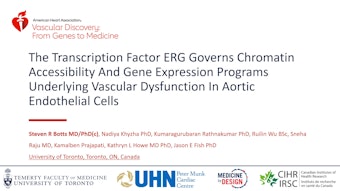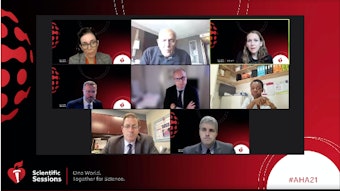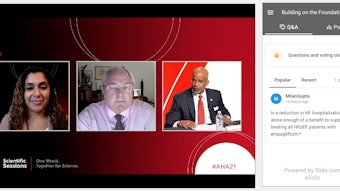Rapid advances in AF management improve treatment

Advances in the management and treatment of atrial fibrillation have a direct bearing on patient care.
“Atrial Fibrillation in 2021: Prepare for New Directions” (3-4 p.m. EST Saturday) will focus on the changing and expanding targets to better control AF rhythm, including earlier rhythm control strategies, lifestyle modifications and stroke and dementia prevention.
Session moderator Rakesh Gopinathannair, MD, MA, FAHA, cardiac EP lab director for the Kansas City Heart Rhythm Institute and professor of medicine at the University of Missouri-Columbia, said the hour-long session features four talks highlighting the state-of-the-art with regards to:
- AF screening
- Advantages of early rhythm control
- Possibilities of AF treatment preventing dementia and reducing stroke
- The effectiveness of lifestyle and risk-factor modification in improving AF-related outcomes
“Overall, this is a must-watch session for #AHA21 attendees,” Dr. Gopinathannair said. “As it provides a 2021 update on the hot topics with regard to AF.”
Andrea Natale, MD, executive medical director of the Texas Cardiac Arrythmia Institute at St. David’s Medical Center in Austin, Texas, is presenting “Lifestyle and Risk Modification for AF: Mainstream or Pie in the Sky?”
There are several risk factors that contribute to the development and progression of AF, including obesity, obstructive sleep apnea, diabetes, hypertension, alcohol, smoking and physical inactivity. Although most of these are modifiable, changing them is often easier said than done, Dr. Natale said.
“The evidence from different studies evaluating the risk-factor management approach have been so compelling that major guidelines now strongly recommend it is a key component of AF management,” he said. “However, it is easier to contemplate than implement this strategy in real life because of poor patient compliance and other circumstantial, social and economic hurdles.”
The path to bringing these changes into the mainstream, Dr. Natale said, is a coordinated effort involving the patient, the doctor and all involved medical professionals, as well as the use of the latest technology.
“A synchronized and holistic approach involving patients as well as health care providers, including nurses, primary care physicians and specialists, is key to making these changes mainstream,” he said. “Motivated patients as well as regular monitoring of the health behaviors of the patients by the treatment providers is very important in accomplishing sustainable results. In this context, it is also noteworthy to mention the critical role of digital apps in keeping close contact with the patients — regularly reminding them of the health targets and encouraging them to remain compliant.”
T. Jared Bunch, MD, head of Heart Rhythm Services at University of Utah Health in Salt Lake City, will tackle the question of how AF treatment could help prevent stroke and dementia. AF is the most common sustained heart rhythm abnormality in clinical practice and is a known cause of strokes that can result in significant disability. The timing and the way AF is treated could significantly lower the risk of those strokes, Dr. Bunch said.
“The timing of the use of anticoagulants (the earlier the better), the type of anticoagulant and the efficacy of the anticoagulant all influence the risk of cognitive decline and dementia,” he said. “We have also learned that the way we treat the rhythm of atrial fibrillation may also lower risk. Early treatment (within 12 months of diagnosis) is associated with lower rates in stroke. In patients selected and treated with ablation in the community, their rates of dementia over time are lower compared to patients not referred and treated with ablation. “
The key is early diagnosis and treatment, Dr. Bunch said, and new information is coming that will help better define those treatments to help lower the risk of brain injuries.
“Early diagnosis and treatment of atrial fibrillation are important if we are going to improve long-term risks of stroke, cognitive decline and dementia. It is critical in those patients at moderate to high risk of stroke that effective anticoagulation use is started at the initial diagnosis,” he said. “There are a lot of emerging data that will help define ways in which treatment of atrial fibrillation will lower the broad spectrum of brain injuries. The benefit will likely be the greatest when the treatment is started early.”
Visit Scientific Sessions Conference Coverage for more articles.











